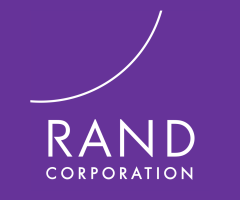RAND Corporation is a non-profit, non-partisan research organisation that develops solutions to public policy challenges. RAND’s research spans issues that vary between energy, education, health care, justice, the environment, international affairs, and national security. Research and analysis are carried out by three divisions that address social and economic policy issues, both in the USA and overseas; by four federally funded research and development centres (FFRDCs) that focus on US national security policy issues; and by RAND’s wholly-owned subsidiaries, RAND Europe and RAND Australia.
ARTIFICIAL INTELLIGENCE
RAND’s research on issues related to artificial intelligence (AI) dates back to 1984, when it published a paper highlighting its Experience in Applying Artificial Intelligence Techniques to Strategic-Level Military-Political War Gaming and in 1986 it published a brief history of its research in AI and expert systems.
In April 2018, RAND hosted a conference on The Promise and Perils of AI, 3D Printing, and Speed which mooted how emerging technologies will pose new risks to people, nations, and global security in the coming decades, what are the most crucial trends, and how to harness their potential. This was part of RAND’s Security 2040 initiative focusing on how technology, people, and ideas are shaping the future of global security.
RAND asked AI and nuclear strategy experts to imagine the state of nuclear weapon systems in 2040 and to explore ways that AI might be a stabilising ‒ or destabilising ‒ force by that time. Their input was shared in a paper titled How Artificial Intelligence Could Increase the Risk of Nuclear War.
In July 2019, the US National Security Commission on Artificial Intelligence (NSCAI) opened a call for submission of new ideas vis-à-vis emerging technology’s role in global order. In response, RAND submitted a wide range of ideas related to issues such as military deception, open-source research, training AI soldier robots, and the role of chess in AI, among other detailed proposals. Nine were accepted for publication by NSCAI’s media partner in this effort, War on the Rocks (WOTR), and a tenth was accepted by The Strategy Bridge. In the same response, RAND argued for more AI verification to ensure trust, as well as for a framework for governing AI military technology. The organisation called on the US government to proactively shape AI’s impact on the next generation of irregular warfare through better capturing innovation in the commercial ecosystem, recruiting and retaining personnel capable of leveraging AI capabilities, and working with allies.
In December 2019, RAND’s National Defence Research Institute produced a congressionally mandated report on The Department of Defense Posture for AI to assess the state of AI relevant to the US Department of Defense (DoD), including AI applications, operational AI, and mission-support AI applications, and to address misconceptions about AI.
RAND produced research on Deterrence in the Age of Thinking Machines, which looked at how AI and autonomous systems could affect deterrence and escalation in conventional crises and conflicts. Currently, RAND Europe is examining ways in which the European Border and Coast Guard can maximise the opportunity provided by AI to support the management of the European Union’s external borders through its research project How AI can support the European Border and Coast Guard.
ROBOTICS
RAND conducts research on drones and autonomous vehicles for warfare. Examples include How to Analyze the Cyber Threat from Drones: Background, Analysis Frameworks, and Analysis Tools, and Automating Army Convoys: Technical and Tactical Risks and Opportunities. Other relevant areas of research focus on game-changing technologies (GCTs) in the European services sectors and skills in the European defence industry.
The organisation supports the US Army and the Office of the Secretary of Defense (OSD) in the development and implementation of applications of robotic systems to achieve the high-magnitude improvements in force responsiveness, lethality, survivability, and supportability called for in future warfighting. It convened a conference on Innovative Robotics Concepts of Operation to provide a platform for examining, exploring, and creating new robotic concepts of operation, and held a policy forum on friendly and unfriendly drones’ usage, ownership, and other applications.
RAND also operates the Homeland Security Operational Analysis Center (HSOAC) for the Department of Homeland Security (DHS). RAND’s Joint Warfare Simulation Analysis Activity (JWSAA) and Carnegie-Mellon University’s Robotics Institute are working on a collaborative approach to military robotics research and analysis to assist the US Army and the Defense Advanced Research Projects Agency (DARPA).
BLOCKCHAIN
RAND developed a research project on the Potential Role of Standards in Supporting the Growth of Distributed Ledger Technologies/Blockchain that pinpointed a set of priority areas that may require future standardisation to support the technology’s growth.
It published research on how digital technologies are changing the way we are able to transact, the implications of such changes on society, and the exchange value and the associated societal impact. It also explored the national security implications of virtual currency (VC) and the potential for non-state actor deployment. As a result on this research, RAND concluded that non-state actors can use VCs to disrupt sovereignty and increase political and/or economic power, but they are unlikely to use established VCs; the development and implementation of VCs could add to security-related technological developments that could aid non-state actors; VCs are not different from other services in the cyberspace; and methods to successfully attack them are not meaningfully different than for any other cyberspace operation; and hence decentralisation affords more, though not total, resilience to disruptions from cyber-attacks.
ARTIFICIAL INTELLIGENCE
- Explores the connections between AI and global security.
- Supports the development of frameworks for governing AI military technology.
ROBOTICS
- Explores the application of robotic systems, drones, and autonomous vehicles in the army.
BLOCKCHAIN
- Advocates for the development of standards in relation to blockchain and distributed-ledger technology.
- Promotes discussions to ensure that development and introduction of such standards are not too early to stifle innovation or too late to risk missing opportunities to maximise the benefits the technology could deliver.
